古文中译英翻译
“文言文”中译英:原来也能译的这么美!
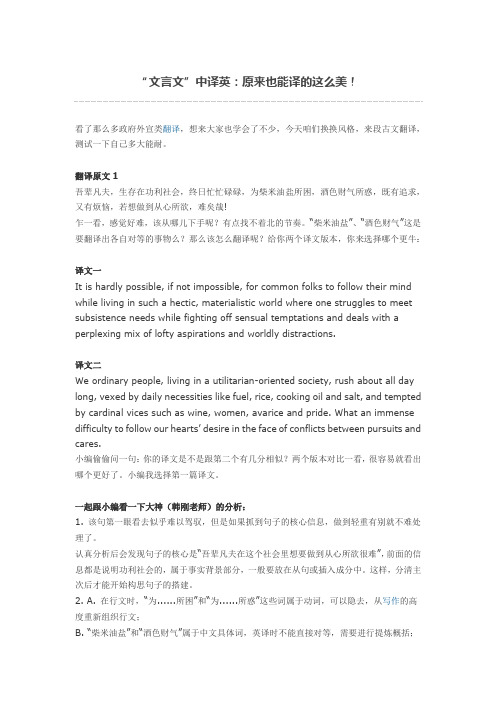
“文言文”中译英:原来也能译的这么美!看了那么多政府外宣类翻译,想来大家也学会了不少,今天咱们换换风格,来段古文翻译,测试一下自己多大能耐。
翻译原文1吾辈凡夫,生存在功利社会,终日忙忙碌碌,为柴米油盐所困,酒色财气所惑,既有追求,又有烦恼,若想做到从心所欲,难矣哉!乍一看,感觉好难,该从哪儿下手呢?有点找不着北的节奏。
“柴米油盐”、“酒色财气”这是要翻译出各自对等的事物么?那么该怎么翻译呢?给你两个译文版本,你来选择哪个更牛:译文一It is hardly possible, if not impossible, for common folks to follow their mind while living in such a hectic, materialistic world where one struggles to meet subsistence needs while fighting off sensual temptations and deals with a perplexing mix of lofty aspirations and worldly distractions.译文二We ordinary people, living in a utilitarian-oriented society, rush about all day long, vexed by daily necessities like fuel, rice, cooking oil and salt, and tempted by cardinal vices such as wine, women, avarice and pride. What an immense difficulty to follow our hearts’ desire in the face of conflicts between pursuits and cares.小编偷偷问一句:你的译文是不是跟第二个有几分相似?两个版本对比一看,很容易就看出哪个更好了。
文言文英语翻译经典句子
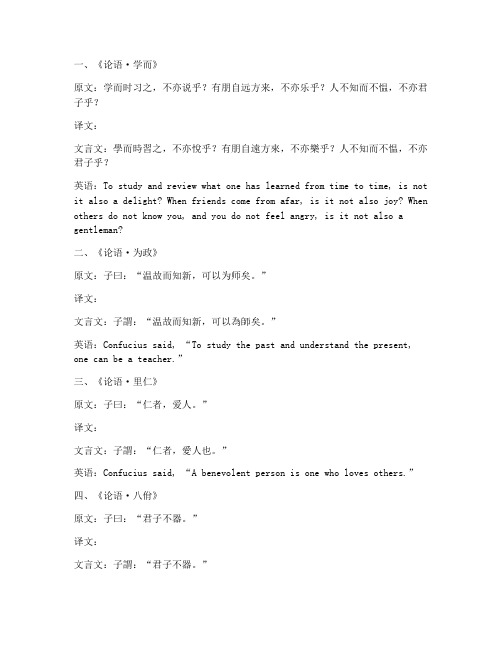
一、《论语·学而》原文:学而时习之,不亦说乎?有朋自远方来,不亦乐乎?人不知而不愠,不亦君子乎?译文:文言文:學而時習之,不亦悅乎?有朋自遠方來,不亦樂乎?人不知而不愠,不亦君子乎?英语:To study and review what one has learned from time to time, is not it also a delight? When friends come from afar, is it not also joy? When others do not know you, and you do not feel angry, is it not also a gentleman?二、《论语·为政》原文:子曰:“温故而知新,可以为师矣。
”译文:文言文:子謂:“温故而知新,可以為師矣。
”英语:Confucius said, “To study the past and understand the present, one can be a teacher.”三、《论语·里仁》原文:子曰:“仁者,爱人。
”译文:文言文:子謂:“仁者,愛人也。
”英语:Confucius said, “A benevolent person is one who loves others.”四、《论语·八佾》原文:子曰:“君子不器。
”译文:文言文:子謂:“君子不器。
”英语:Confucius said, “A gentleman is not a tool.”五、《论语·述而》原文:子曰:“三人行,必有我师焉。
择其善者而从之,其不善者而改之。
”译文:文言文:子謂:“三人行,必有我師焉。
選其善者而從之,其不善者而改之。
”英语:Confucius said, “Among three people walking together, there must be someone I can learn from. I will follow the good ones and correct the bad ones.”六、《论语·泰伯》原文:曾子曰:“君子以文会友,以友辅仁。
中文的古诗翻译成英文阅读
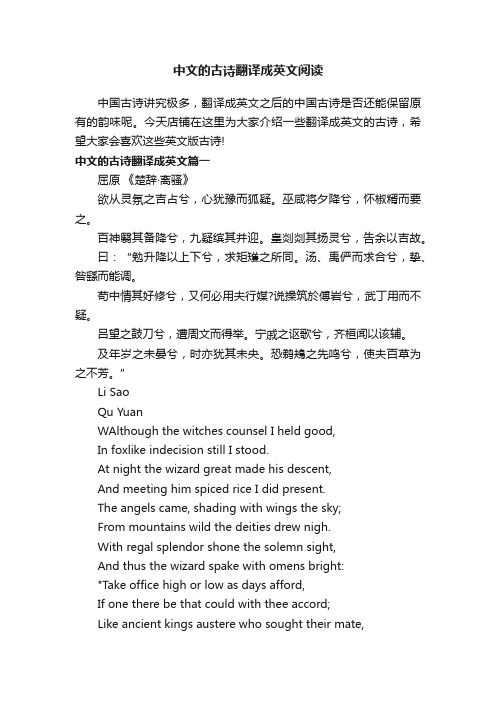
中文的古诗翻译成英文阅读中国古诗讲究极多,翻译成英文之后的中国古诗是否还能保留原有的韵味呢。
今天店铺在这里为大家介绍一些翻译成英文的古诗,希望大家会喜欢这些英文版古诗!中文的古诗翻译成英文篇一屈原《楚辞·离骚》欲从灵氛之吉占兮,心犹豫而狐疑。
巫咸将夕降兮,怀椒糈而要之。
百神翳其备降兮,九疑缤其并迎。
皇剡剡其扬灵兮,告余以吉故。
曰:“勉升降以上下兮,求矩矱之所同。
汤、禹俨而求合兮,挚、咎繇而能调。
苟中情其好修兮,又何必用夫行媒?说操筑於傅岩兮,武丁用而不疑。
吕望之鼓刀兮,遭周文而得举。
宁戚之讴歌兮,齐桓闻以该辅。
及年岁之未晏兮,时亦犹其未央。
恐鹈鴂之先鸣兮,使夫百草为之不芳。
”Li SaoQu YuanWAlthough the witches counsel I held good,In foxlike indecision still I stood.At night the wizard great made his descent,And meeting him spiced rice I did present.The angels came, shading with wings the sky;From mountains wild the deities drew nigh.With regal splendor shone the solemn sight,And thus the wizard spake with omens bright:"Take office high or low as days afford,If one there be that could with thee accord;Like ancient kings austere who sought their mate,Finding the one who should fulfill their fate.Now if thy heart doth cherish grace within,What need is there to choose a go-between?A convict toiled on rocks to expiateHis crime; his sovereign gave him great estate.A butcher with his knife made roundelay;His king chanced there and happy proved the day.A prince who heard a cowherd chanting lateRaised him to be a councilor of state.Before old age o' ertake thee on thy way,Life still is young; to profit turn thy day.Spring is but brief, when cuckoos start to sing,And flowers will fade that once did spread and spring."经典的中文的古诗翻译成篇二屈原《楚辞·离骚》何琼佩之偃蹇兮,众薆然而蔽之?惟此党人之不谅兮,恐嫉妒而折之。
古语名句文言文英语翻译

一、《论语·学而》原文:学而时习之,不亦说乎?有朋自远方来,不亦乐乎?人不知而不愠,不亦君子乎?翻译:To study and review what one has learned at the proper time, is not this a joy? To have friends coming from afar, is not this a delight? To be unoffended when others do not understand you, is not this the attribute of a gentleman?二、《论语·为政》原文:子曰:“政者,正也。
子帅以正,孰敢不正?”翻译:Confucius said, “The essence of politics is righteousness. If you lead with righteousness, who dares to be unrighteous?”三、《论语·八佾》原文:子曰:“八佾舞于庭,是可忍也,孰不可忍也?”翻译:Confucius said, “If the danc e of the eight-line formation can be tolerated in the courtyard, what cannot be tolerated?”四、《论语·里仁》原文:子曰:“富而可求也,虽执鞭之士,吾亦为之。
如不可求,从吾所好。
”翻译:Confucius said, “If wealth can be sought, even if one has to be a chariot driver, I would do it. If not, I will follow my own inclinations.”五、《论语·述而》原文:子曰:“三人行,必有我师焉。
汉英古文翻译参考

汉英古文翻译参考五柳先生传(注:2003年考题)先生不知何许人也,亦不详其姓字。
宅边有五柳树,因以为号焉。
闲静少言,不慕荣利。
好读书,不求甚解;每有会意,便欣然忘食。
性嗜酒,家贫而不能常得。
亲旧知其如此,或置酒而招之。
造饮辄尽,期在必醉;既醉而退,曾不吝请去留。
环睹萧然,不蔽风日。
短褐穿结,箪瓢屡空。
晏如也。
常著文章自娱。
颇示己志。
忘怀得失,以此自终。
《陶潜—陶渊明集》Mr. Five WillowsNo one knew where this gentleman came from and what his name was. There were five willows by his house; therefore he was named Mr. Five Willows. He was quiet and reserved, not envious of high position or great wealth. He enjoyed reading, but never tried hard to look for deeper meanings. Each time when he caught the point in a book, he would be in such high spirits that he would simply forget to have dinner. He was very fond of liquor but too poor to drink often. His old friends knew it, so they often invited him to have wine. He always drank to the bottom and got drunk. They he took his leave, and nobody minded.For his whole life, he dwelled in a humble house, had scanty clothing, and always lacked food, but he lived in peace. Sometimes he entertained himself by writing to show his ideals, and he never cared for gain or loss.苛政猛于虎(礼记工员檀弓)(注:2004年考题)孔子过泰山侧,有妇人哭于墓者而哀。
孔子文言文英语翻译

孔子曰:“学而时习之,不亦说乎?有朋自远方来,不亦乐乎?人不知而不愠,不亦君子乎?”翻译:Confucius said, "To learn and to practice what one has learned at the proper time, is not this a joy? To have friends coming from afar, is not this a delight? To be unaware of others' understanding and yet not to be angry, is not this the conduct of a gentleman?"孔子认为,学习之后要及时复习,这是令人愉悦的事情。
有朋友从远方来,这是令人高兴的事情。
别人不了解自己,自己却不生气,这是君子的行为。
原文:子曰:“三人行,必有我师焉。
择其善者而从之,其不善者而改之。
”翻译:Confucius said, "Among three people walking together, there must be someone who can be my teacher. I shall follow the good in him, and correct the bad."孔子说:“三个人同行,其中必定有我可以向他学习的人。
我要选择他的优点去学习,对于他的缺点,我要加以改正。
”原文:子曰:“温故而知新,可以为师矣。
”翻译:Confucius said, "By reviewing the past, one can gain new insights, and thus can be considered a teacher."孔子说:“通过温习过去的知识,可以获得新的认识,这样就可以成为别人的老师了。
常用文言文英语翻译
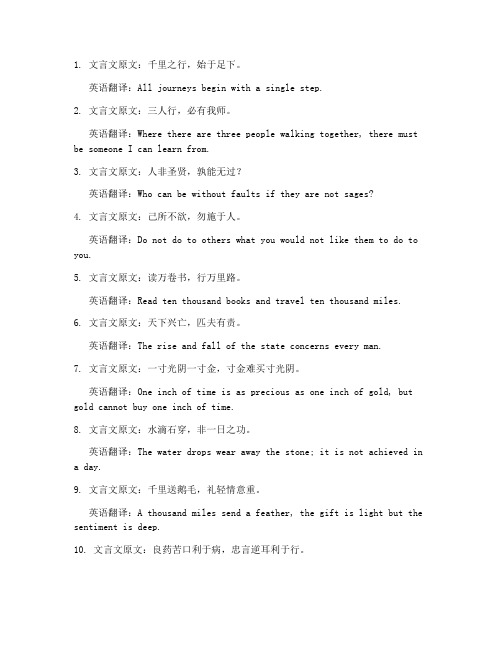
1. 文言文原文:千里之行,始于足下。
英语翻译:All journeys begin with a single step.2. 文言文原文:三人行,必有我师。
英语翻译:Where there are three people walking together, there must be someone I can learn from.3. 文言文原文:人非圣贤,孰能无过?英语翻译:Who can be without faults if they are not sages?4. 文言文原文:己所不欲,勿施于人。
英语翻译:Do not do to others what you would not like them to do to you.5. 文言文原文:读万卷书,行万里路。
英语翻译:Read ten thousand books and travel ten thousand miles.6. 文言文原文:天下兴亡,匹夫有责。
英语翻译:The rise and fall of the state concerns every man.7. 文言文原文:一寸光阴一寸金,寸金难买寸光阴。
英语翻译:One inch of time is as precious as one inch of gold, but gold cannot buy one inch of time.8. 文言文原文:水滴石穿,非一日之功。
英语翻译:The water drops wear away the stone; it is not achieved in a day.9. 文言文原文:千里送鹅毛,礼轻情意重。
英语翻译:A thousand miles send a feather, the gift is light but the sentiment is deep.10. 文言文原文:良药苦口利于病,忠言逆耳利于行。
陋室铭--英汉翻译赏析

英汉译文赏析作业舒卉陋室铭唐·刘禹锡山不在高,有仙则名。
水不在深,有龙则灵。
斯是陋室,惟吾德馨。
苔痕上阶绿,草色入帘青。
谈笑有鸿儒,往来无白丁。
可以调素琴,阅金经。
无丝竹之乱耳,无案牍之劳形。
南阳诸葛庐,西蜀子云亭。
孔子云:“何陋之有?”The Inscription of My Humble Room——Liu Yuxi from Tang DynastyA mountain needn't be so high, just becomes famous as there is a immortal. A lake needn't be so deep, just becomes miraculous as there is a dragon. My room is humble, but becomes fragrant as I am living in it. The moss creeping onto the stairs turns them green. The color of the grass through the curtains turns the room blue. Erudites come in and talk together. And there is no unlearned man. I can enjoy playing my clean qin and reading buddhist scriptures. There is no the disturbance of nosy that disturb the ears and any burden of reading official documents. Neither of Zhuge Liang's Cottage in Nanyang and Yang Ziyun's Pavilion in Xishu are not compared with mine. Confucius said: "Is there any humble?"译文的赏析:我认为陋室铭的这篇英文翻译还是不错的,个人也做了一些修改。
英文 翻译 古文版 白话版 诗
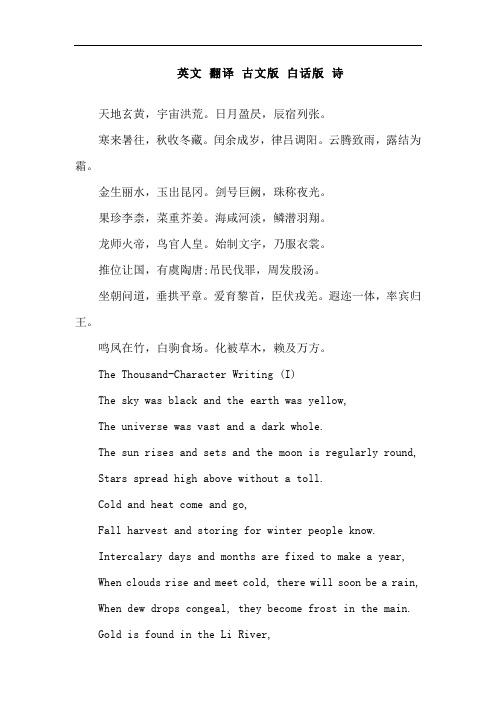
英文翻译古文版白话版诗天地玄黄,宇宙洪荒。
日月盈昃,辰宿列张。
寒来暑往,秋收冬藏。
闰余成岁,律吕调阳。
云腾致雨,露结为霜。
金生丽水,玉出昆冈。
剑号巨阙,珠称夜光。
果珍李柰,菜重芥姜。
海咸河淡,鳞潜羽翔。
龙师火帝,鸟官人皇。
始制文字,乃服衣裳。
推位让国,有虞陶唐;吊民伐罪,周发殷汤。
坐朝问道,垂拱平章。
爱育黎首,臣伏戎羌。
遐迩一体,率宾归王。
鸣凤在竹,白驹食场。
化被草木,赖及万方。
The Thousand-Character Writing (I)The sky was black and the earth was yellow,The universe was vast and a dark whole.The sun rises and sets and the moon is regularly round, Stars spread high above without a toll.Cold and heat come and go,Fall harvest and storing for winter people know.Intercalary days and months are fixed to make a year,When clouds rise and meet cold, there will soon be a rain, When dew drops congeal, they become frost in the main.Gold is found in the Li River,Jade is found in the Kunlun Mountains.The best-known sword is called Juque,The most famous peal is known as Yueguang.Plum and a certain kind of apple are among best fruits, Important vegetables include mustard and ginger.Sea water is salty while river water is fresh,Fishes swim in water while birds fly in the air.Longshi, Huodi, Niaoguan and Renhuang, as legend goes, Were celebrities of China's remote ages.Cang Jie created Chinese characters,And some other people began to make clothes.Good emperors Yao and ShunAbdicated willingly,The Zhou Dynasty's Wu and the Shang Dynasty' s TangWere the emperors who loved common people and punished criminals severely.A wise emperor often consulted his good officials to administer his empire,And the empire was governed in peace.He loved his subjects and tended the multitude,The minority nationalities like Rong and Qiang could be ruled with ease.Places far and near come to be under one ruler,All the people voluntarily submitted to the authority of the emperor.Phoenixes are singing merrily among bamboos,White colts are gazing on grassland.The grace of a virtuous monarch will nourish the grass and trees,And benefit the whole empire on many hands.《诗经--国风·郑风·大叔于田》叔于田,乘乘马。
常用文言文及翻译

一、文言文简介
文言文,又称古文,是我国古代的一种书面语言,起源于先秦,盛行于汉魏六朝,至唐宋明清仍有所使用。
文言文以其独特的语法结构、丰富的词汇和深邃的文化内涵,在我国文学史上占有重要地位。
以下列举一些常用的文言文及其翻译。
二、常用文言文及翻译
1. 常用文言文:
(1)学而时习之,不亦说乎?有朋自远方来,不亦乐乎?人不知而不愠,不亦君子乎?
翻译:学习并时常复习,不是很愉快吗?有朋友从远方来,不是很快乐吗?别人不了解我,我不生气,不是很君子吗?
(2)海内存知己,天涯若比邻。
翻译:四海之内有知己,即使相隔天涯海角,也感觉像是邻居一样。
(3)青青子衿,悠悠我心。
翻译:那青青的衣领,寄托着我悠悠的思念。
(4)问君能有几多愁,恰似一江春水向东流。
翻译:问您能有多少忧愁,恰似一条江水向东流去。
2. 常用文言文:
(1)穷则独善其身,达则兼济天下。
翻译:处境困难时,就要修养自己的品德;事业成功时,就要帮助天下人。
(2)春风得意马蹄疾,一日看尽长安花。
翻译:春风吹得马蹄轻快,一天之内看尽了长安城中的美景。
(3)岁月静好,与君语;细水流年,与君同。
翻译:岁月静好,与你说话;细水流年,与你一同度过。
(4)浮生若梦,为欢几何?
翻译:人生如梦,又能快乐多少呢?
三、总结
以上列举的文言文及翻译,只是常用文言文中的一小部分。
学习文言文,不仅能了解我国古代的文化,还能提高自己的文学素养。
在学习过程中,我们要多读、多背、多思考,才能更好地掌握文言文。
优秀的文言文翻译英语
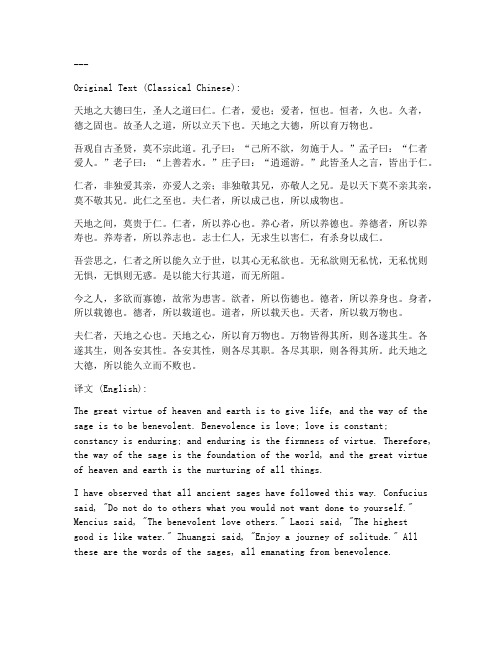
---Original Text (Classical Chinese):天地之大德曰生,圣人之道曰仁。
仁者,爱也;爱者,恒也。
恒者,久也。
久者,德之固也。
故圣人之道,所以立天下也。
天地之大德,所以育万物也。
吾观自古圣贤,莫不宗此道。
孔子曰:“己所不欲,勿施于人。
”孟子曰:“仁者爱人。
”老子曰:“上善若水。
”庄子曰:“逍遥游。
”此皆圣人之言,皆出于仁。
仁者,非独爱其亲,亦爱人之亲;非独敬其兄,亦敬人之兄。
是以天下莫不亲其亲,莫不敬其兄。
此仁之至也。
夫仁者,所以成己也,所以成物也。
天地之间,莫贵于仁。
仁者,所以养心也。
养心者,所以养德也。
养德者,所以养寿也。
养寿者,所以养志也。
志士仁人,无求生以害仁,有杀身以成仁。
吾尝思之,仁者之所以能久立于世,以其心无私欲也。
无私欲则无私忧,无私忧则无惧,无惧则无惑。
是以能大行其道,而无所阻。
今之人,多欲而寡德,故常为患害。
欲者,所以伤德也。
德者,所以养身也。
身者,所以载德也。
德者,所以载道也。
道者,所以载天也。
天者,所以载万物也。
夫仁者,天地之心也。
天地之心,所以育万物也。
万物皆得其所,则各遂其生。
各遂其生,则各安其性。
各安其性,则各尽其职。
各尽其职,则各得其所。
此天地之大德,所以能久立而不败也。
译文 (English):The great virtue of heaven and earth is to give life, and the way of the sage is to be benevolent. Benevolence is love; love is constant; constancy is enduring; and enduring is the firmness of virtue. Therefore, the way of the sage is the foundation of the world, and the great virtue of heaven and earth is the nurturing of all things.I have observed that all ancient sages have followed this way. Confucius said, "Do not do to others what you would not want done to yourself." Mencius said, "The benevolent love others." Laozi said, "The highest good is like water." Zhuangzi said, "Enjoy a journey of solitude." All these are the words of the sages, all emanating from benevolence.Benevolence is not only the love for one's own family, but also the love for the families of others; not only the respect for one's own brother, but also the respect for the brothers of others. Therefore, no one is not loving their own family, and no one is not respecting their own brother. This is the ultimate of benevolence. Benevolence is the way to cultivate oneself, and the way to cultivate all things.Between heaven and earth, nothing is more precious than benevolence. Benevolence is the way to nourish the heart; to nourish the heart is to nourish virtue; to nourish virtue is to nourish longevity; to nourish longevity is to nourish one's aspirations. The noble and benevolent do not seek to live at the expense of benevolence, but are willing to sacrifice their lives to achieve it.I have often thought about it, and the reason why benevolent people can。
唐诗名句汉译英赏析

唐诗名句英译赏析1.欲穷千里目,更上一层楼------王之涣“登鹳鹊楼”Y ou can enjoy a grander sight, By climbing to a greater height.----Wang Zhihuan “On the Stork Tower.”2.谁言寸草心,报得三春晖------孟郊“游子吟”Such kindness as young grass receives. From the warm sun can’t be repaid.----Me ng Jiao “Song of a Roamer”.3.夜来风雨声,花落知多少------孟浩然“春晓”After one night of wind and showers, How many are the fallen flowers!----Meng Haoran “ A Spring Morning”4.独在异乡为异客,每逢佳节倍思亲------王维“九月九日忆山东兄弟”Alone, an only stranger in a foreign land, I doubtfully pine for my kinsfolk on holiday.----Wang Wei “ Thinking of My Brothers on Mountain Climbing Day”5.问君能有几多愁,恰似一江春水向动流-----李煜“虞美人”Should I be asked how much anguish I have found, Strange! It’s like flowing water, eastward bound.----Li Y u “Y umeiren”6.山穷水尽疑无路,柳暗花明又一村-----陆游“游山西村”Just as the weary traveler despairs f finding a road, Lo! A village appears and the shade of willows and riotous flowers beckon.----a sudden glimpse of hope in the dark mist of bewilderment.----LuY ou.7.抽刀断水水更流,举杯消愁愁更愁-----李白“宣州谢眺楼饯别校书叔云”Cut running water with a sword, it will faster flow; Drink wine to drown your sorrow, it will heavier grow.----Li Bai “Farewell to Uncle Y un, the Imperial Librarian, at Xie Tiao’s pavilion in Xuan Zhou”8.清明时节雨纷纷,路上行人欲断魂-----杜牧Unbroken sped of wet weather around the Qingming Festival,9.熟读唐诗三百首,不会吟诗也会吟One can recite and compose poems so long as he has learned by heart three hundred pieces of Tang Poetry.10.酒逢知己千杯少,话不投机半句多。
中国古诗词的英文翻译

中国古诗词的英文翻译我们极少有人像托姆布雷一样阅读,将自己沉浸在希腊文、拉丁文和英文诗歌里。
下面小编整理了中国古诗词的英文翻译,希望大家喜欢!中国古诗词的英文翻译品析《孙子兵法---作战篇》孙子曰:凡用兵之法,驰车千驷,革车千乘,带甲十万,千里馈粮。
则内外之费,宾客之用,胶漆之材,车甲之奉,日费千金,然后十万之师举矣。
其用战也胜,久则钝兵挫锐,攻城则力屈,久暴师则国用不足。
夫钝兵挫锐,屈力殚货,则诸侯乘其弊而起,虽有智者,不能善其后矣。
故兵闻拙速,未睹巧之久也。
夫兵久而国利者,未之有也。
故不尽知用兵之害者,则不能尽知用兵之利也。
善用兵者,役不再籍,粮不三载,取用于国,因粮于敌,故军食可足也。
国之贫于师者远输,远输则百姓贫;近师者贵卖,贵卖则百姓财竭,财竭则急于丘役。
力屈、财殚,中原内虚其家,百姓之费,十去其七;公家之费,破军罢马,甲胄矢弩,戟楯蔽橹,丘牛大车,十去其六。
故智将务食于敌,食敌一钟,当吾二十钟;[艹+忌]杆一石,当吾二十石。
故杀敌者,怒也;取敌之利者,货也。
故车战得车十乘以上,赏其先得者,而更其旌旗,车杂而乘之,卒善而养之,是谓胜敌而益强。
故兵贵胜,不贵久。
故知兵之将,生民之司命,国家安危之主也。
Waging WarSun WuIn operations of war — when one thousand fast four-horse chariots, one thousand heavychariots, and one thousand mail-clad soldiers are required; when provisions are transported forathousand li; when there are expenditures at home and at the front, and stipends forentertainment of envoys and advisers —the cost of materials such as glue and lacquer, andof chariots and armor, will amount to one thousand pieces of gold a day. One hundredthousand troops may be dispatched only when this money is in hand.A speedy victory is the main object in war. If this is long in coming, weapons are blunted andmorale depressed. If troops are attacking cities, their strength will be exhausted. When thearmy engages in protracted campaigns, the resources of the state will fall short. When yourweapons are dulled and ardor dampened, your strength exhausted and treasure spent, thechieftains of the neighboring states will take advantage of your crisis to act. In that case, noman, however wise, will be able to avert the disastrous consequences that ensue. Thus, whilewe have heard of stupid haste in war, we have not yet seen a clever operation that wasprolonged. For there has never been a protracted war which benefited a country. Therefore,those unable to understand the evils inherent in employing troops are equally unable tounderstand the advantageous ways of doing so.Those adept in waging war do not require a second levy of conscripts or more that twoprovisionings. They carry military equipment from the homeland, but rely on the enemy forprovisions. Thus, the army is plentifully provided with food.When a country is impoverished by military operations, it is due to distant transportation;carrying supplies for great distances renders the people destitute. Where troops are gathered,prices go up. When prices rise, the wealth of the people is drained away. When wealth isdrained away, the people will be afflicted with urgent and heavy exactions. With this loss ofwealthand exhaustion of strength the households in the country will be extremely poor andseven-tenths of their wealth dissipated. As to government expenditures, those due to broken-down chariots, worn-out horses, armor and helmets, bows and arrows, spears and shields,protective mantlets, draft oxen, and wagons will amount to 60 percent of the total.Hence, a wise general sees to it that his troops feed on the enemy, for one zhong of theenemy's provisions is equivalent to twenty of one's own and one shi of the enemy's fodder totwenty shi of one's own.In order to make the soldiers courageous in overcoming the enemy, they must be roused toanger. In order to capture more booty from the enemy, soldiers must have their rewards.Therefore, in chariot fighting when more than ten chariots are captured, reward those who takethe first. Replace the enemy's flags and banners with you own, mix the captured chariots withyours, and mount them. Treat the prisoners of war well, and care for them. This is called'winning a battle and becoming stronger.'Hence, what is valued in war is victory, not prolonged operations. And the general whounderstands how to employ troops is the minister of the people's fate and arbiter of thenation's destiny.经典的中国古诗词的英文翻译《孙子兵法---谋攻篇》孙子曰:凡用兵之法,全国为上,破国次之;全军为上,破军次之;全旅为上,破旅次之;全卒为上,破卒次之;全伍为上,破伍次之。
古代文言文英语翻译
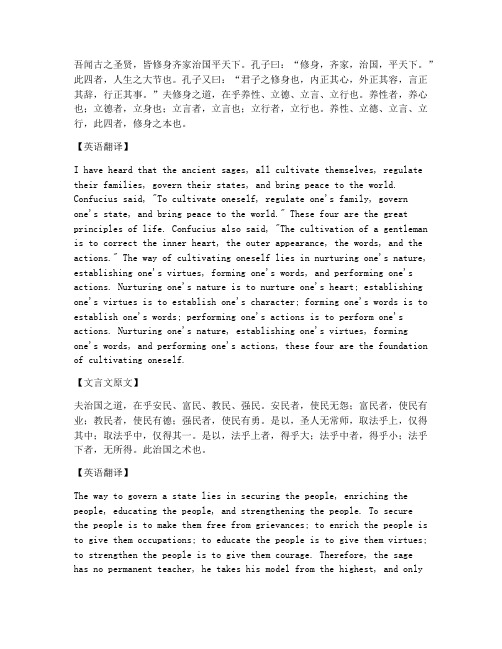
吾闻古之圣贤,皆修身齐家治国平天下。
孔子曰:“修身,齐家,治国,平天下。
”此四者,人生之大节也。
孔子又曰:“君子之修身也,内正其心,外正其容,言正其辞,行正其事。
”夫修身之道,在乎养性、立德、立言、立行也。
养性者,养心也;立德者,立身也;立言者,立言也;立行者,立行也。
养性、立德、立言、立行,此四者,修身之本也。
【英语翻译】I have heard that the ancient sages, all cultivate themselves, regulate their families, govern their states, and bring peace to the world. Confucius said, "To cultivate oneself, regulate one's family, governone's state, and bring peace to the world." These four are the great principles of life. Confucius also said, "The cultivation of a gentleman is to correct the inner heart, the outer appearance, the words, and the actions." The way of cultivating oneself lies in nurturing one's nature, establishing one's virtues, forming one's words, and performing one's actions. Nurturing one's nature is to nurture one's heart; establishing one's virtues is to establish one's character; forming one's words is to establish one's words; performing one's actions is to perform one's actions. Nurturing one's nature, establishing one's virtues, formingone's words, and performing one's actions, these four are the foundation of cultivating oneself.【文言文原文】夫治国之道,在乎安民、富民、教民、强民。
爱情文言文翻译成英语

青青子衿,悠悠我心。
但为君故,沉吟至今。
青青子佩,悠悠我思。
但为君故,辗转反侧。
执子之手,与子偕老。
执子之手,与子偕老。
山无陵,江水为竭。
冬雷震震,夏雨雪。
天地合,乃敢与君绝。
译文中英:Verse 1:The green of your shirt, my heart's deep longing.For your sake alone, I ponder, yearning still.The green of your belt, my thoughts wander free.For your sake alone, I toss and turn.Verse 2:Hold your hand, and let us grow old together.Hold your hand, and let us grow old together.Mountains may crumble, rivers may dry.Thunder in winter, snow in summer.When heaven and earth unite, then may I part from you.Explanation:The poem is a classic Chinese love lyric, expressing deep affection and a commitment to eternal love. The translation aims to capture the essence of the original, using poetic language in English to convey the same sentiments of longing, devotion, and the desire for eternal togetherness. The use of imagery, such as the mountains and rivers, and natural phenomena like thunder and snow, adds a sense of timelessness and the passage of seasons to the theme of enduring love.。
文言文外语翻译

古之避秦时乱,率妻子邑人来此绝境,不复出焉,遂与外人间隔。
问今是何世,乃不知有汉,无论魏、晋。
此人为具言其姓字、乡里、所从至者,问今是何代,具答之。
便要还家,设酒杀鸡作食。
村中闻有此人,咸来问讯。
自云先世避秦,率妻子邑人来此绝境,不复出焉,遂与外人间隔。
问今是何世,乃不知有汉,无论魏、晋。
此人一一为具言所闻,皆叹惋。
余人各复延至其家,皆出酒食。
停数日,辞去。
此中人语云:“不足为外人道也。
”既出,得其船,便扶向路,处处志之。
及郡下,诣太守,说如此。
太守即遣人随其往,寻向所志,遂迷,不复得路。
南阳刘子骥,高尚士也,闻之,欣然规往。
未果,寻病终,后遂无问津者。
向吾不为斯役,则久已病矣。
夫芸芸众生,皆为名利所困,何不归隐山林,求一清静之地,远离尘嚣,以终天年。
吾独何幸,得此桃花源,与世隔绝,如入仙境。
然此间乐,不若归家之乐也。
余以愚钝,不能如子骥之远行,故作此记,以述其事。
吾虽未能至,然心向往之。
愿得此良辰美景,与知己共赏,何其快哉!今译:古时候,有人为了避免秦朝的战乱,带领妻子、儿女和同乡们来到这个与世隔绝的地方,从此不再外出,与外界隔绝。
有人问现在是什么朝代,他们竟然不知道有汉朝,更不用说魏、晋两朝了。
这个人详细地告诉了他们自己的姓氏、籍贯和来此地的原因,问现在是什么时代,他一一作了回答。
于是,他们邀请他回家,摆酒杀鸡款待他。
村子里的人听说有这个人,都来打听消息。
他自称祖先为了躲避秦朝的战乱,带领妻子、儿女和同乡们来到这个与世隔绝的地方,从此不再外出,与外界隔绝。
他问现在是什么时代,他们竟然不知道有汉朝,更不用说魏、晋两朝了。
这个人一一详细地告诉了他们所听到的一切,大家都感叹不已。
其他人也纷纷邀请他到自己家中,拿出酒食款待他。
他在这里住了几天,然后告辞离去。
这里的人告诉他:“这里的情况不值得对外人说。
”他离开后,找到了自己的船,就顺着原来的路回去,一路上都在做标记。
到了郡城,他去找太守,说了这件事。
文言文用外语翻译

春光乍泄,万物复苏,草木葱茏,花香鸟语。
余闻此盛景,遂决意一日游园,以寻春之韵味。
是日也,天朗气清,惠风和畅。
余披缁衣,携鹤氅,踱步于曲径通幽之处。
遥望园中,绿意盎然,桃李争艳,蝶舞蜂喧。
心旷神怡,不胜欢喜。
行至荷塘,只见荷花盛开,清香四溢。
莲叶田田,如盖如伞,映日荷花别样红。
余驻足良久,悠然神往,遂赋诗一首:荷塘深处夏已来,荷花含笑映朝晖。
莲叶轻摇风送香,鱼跃鸢飞乐未央。
既游荷塘,复前行,至桃花源。
此处古木参天,曲径通幽,宛若仙境。
桃花如霞,映衬碧空,蝶儿翩翩,蜂儿嗡嗡,好不热闹。
余步入其中,仿佛置身于陶渊明笔下的桃花源,忘却尘世烦恼。
游罢桃花源,又至菊园。
此时虽非菊花开时,然菊叶扶疏,香气袭人。
余心有所感,遂吟诗一首:菊园幽径深,幽香溢满林。
叶扶风送影,花映日含金。
既游菊园,复至梅园。
梅园之中,梅树参天,梅花点点,似雪如霞。
虽非梅花盛开之时,然梅香依旧,令人心旷神怡。
余立于梅园之中,思绪万千,遂作诗一首:梅园雪未消,梅影映清波。
寒香扑鼻来,心旷神怡多。
游园至此,余已疲乏,遂寻一石凳而坐,静观园中景致。
此时夕阳西下,余观天边彩霞,心中感慨万千。
遂赋诗一首:夕阳无限好,只是近黄昏。
游园一日事,心旷神怡余。
日暮时分,余遂告别园中诸景,踏着夕阳余晖,缓缓归去。
此次游园,虽只有一日,然心中喜悦,难以言表。
春日游园,实为人生一大乐事也。
翻译:Spring Garden Visit RecordThe spring light broke through, all things复苏, the grass and trees are lush, the flowers are fragrant and the birds sing. Upon hearing this splendid scene, I decided to take a day to visit the garden to seek the essence of spring.On that day, the sky was clear and bright, the breeze was gentle and pleasant. I wore a dark robe, carried a crane robe, and walked along the winding path. Looking into the garden, it was lush with greenery, the peach and plum blossoms were in full bloom, and the butterflies danced and the bees buzzed. The mind was wide open and very happy.Walking to the lotus pond, I saw lotus flowers blooming, their fragrance spreading far. The lotus leaves were lush, like umbrellas, reflecting the sun and making the red lotus even more beautiful. I stood there for a long time, lost in thought, and thus wrote a poem:Deep in the lotus pond, summer has already come,The lotus flowers smile, reflecting the morning sun.The lotus leaves sway, the wind sends the scent,The fish leap and the birds fly, the joy is endless.After visiting the lotus pond, I continued on to the Peach Blossom Spring. Here, ancient trees soared into the sky, winding paths led to the depths, as if in a fairyland。
- 1、下载文档前请自行甄别文档内容的完整性,平台不提供额外的编辑、内容补充、找答案等附加服务。
- 2、"仅部分预览"的文档,不可在线预览部分如存在完整性等问题,可反馈申请退款(可完整预览的文档不适用该条件!)。
- 3、如文档侵犯您的权益,请联系客服反馈,我们会尽快为您处理(人工客服工作时间:9:00-18:30)。
• Alas!The tradition of learning from the teacher has long been neglected. Thus it is difficult to find a person without any doubts at all. Ancient sages,who far surpassed us, even learned from their teachers. People today,who are far inferior to them,regard learning from the teacher as a disgrace. Thus,wise men become more wise and unlearned men become more foolish. This explains what makes a wise man and what makes a foolish man.
• [4] 彼童子之师,授之书而习其句读者,非吾所 谓传其道、解其惑者也。句读之不知,惑之不解, 或师焉,或不焉,小学而大遗,吾未见其明也。
• The teachers of their children only show them how to read a book sentence by sentence, not to be mentioned in the same breath as those whom I refer to as passing on truth and solving puzzles. For lack of reading skills, one seeks the help of teachers, while for unsolved puzzles, one acts contrariwise. As It is indeed learning the lesser but giving up the greater. , I do not see its wisdom. • …this is not teacher I have in mind who can pass on the truth and dispel ignorance. If we want to learn to read but not to dispel ignorance, we are learning the lesser and giving up the greater, which is hardly intelligent. • The teacher of his son teaches the child only reading and punctuation,which is not propagating the doctrine or resolving doubts as the aforementioned. I
• "It is universally admitted that the unicorn is a supernatural being of good omen; such is declared in all the odes, annals, biographies of illustrious men and other texts whose authority is unquestionable. Even children and village women know that the unicorn constitutes a favorable presage. But this animal does not figure among the domestic beasts, it is not always easy to find, it does not lend itself to classification. It is not like the horse or the bull, the wolf or the deer. In such conditions, we could be face to face with a unicorn and not know for certain what it was. We know that such and such an animal with horns is a bull. But we do not know what the unicorn is like."
• 麟之為靈,昭昭也。詠於詩,書於春秋,雜出於 傳記百家之書。雖婦人小子,皆知其為祥也。然 麟之為物,不畜於家,不恆有於天下。其為形也 不類,非若馬牛犬豕豺狼麋鹿然。然則,雖有麟, 不可知其為麟也。角者吾知其為牛也,鬣者吾知 其為馬。犬、豕、豺、狼、麋、鹿,吾知其為犬、 豕、豺、狼、麋、鹿。為麟也不可知,不可知則 其謂之不祥也亦宜。雖然,麟之出,必有聖人在 乎位,麟為聖人出也。聖人者,必之麟,麟之果 不為不祥也。又曰:麟之所以為麟者,以德不以 形。若麟之出不待聖人則謂之不祥也亦宜。
• [3]嗟乎!师道之不传也久矣,欲人之无惑 也难矣。古之圣人,其出人也远矣,犹且 从师而问焉;今之众人,其下圣人也亦远 矣,而耻学师。是故圣益圣,愚益愚。圣 人之所以为圣,愚人之所以为愚,其皆出 于此乎?
• Alas, it is a long time since the admirable tone of respecting teachers ceased to pass on! How hard it would be to expect a man to be free of puzzle! Sages in olden times outstripped by far the ordinary people. Nevertheless, they had teachers and asked them questions. Nowadays the multitude, though much inferior to sages, are ashamed of being instructed by teachers. As a consequence, sages become more sage, and ignoramuses more ignorant. The wisdom of the former and the stupidity of the latter---are they not all caused by this?
• 子曰:“由!诲汝知之乎!知之为知之,不知为不知, 是知也。” • The Master said, “Yu, shall I teach you what knowledge is? When you know a thing, to hold that you know it; and when you do not know a thing, to allow that you do not know it;---this is knowledge.(translated by James Legge) • Confucius said to Tzu-lu, “Shall I teach you, what is understanding? To be aware of what you know and to be aware of what you do not know---that is understanding.”(based on Ku Hung-ming’s translation) • He said: Yu, want a definition of knowledge? To know is to act knowledge, and, when you do not know, not to try to appear as if you did, that’s knowing. (translated by Ezra Pound)
• 子曰:“不患人之不已知,患不知人也。” • The Master said, “ I will not be afflicted at men’s not knowing me; I will be afflicted that I do not know men.” (translated by James Legge) • The Master said, (the good man) does not grieve that other people do not recognize his merits. His only anxiety is lest he should fail to recognize theirs. (translated by Arthur Waley) • He said, Not worried that men do not know me, but that I do not understand men. (translated by Ezra Pound)
• [2]生乎吾前,吾从而师之,吾师道也,夫庸知 其年之先后生于吾乎?是故无贵无贱,无长无 少,道之所存,师之所存也。
• The men born before me surely know the truth before me, so I respect them as teachers, whereas those born after me may also know the truth before me, I likewise respect them as teachers. It is the truth that I endeavour to learn. Must I know beforehand whether my teacher was born earlier or later than I? Therefore, no distinction should be made between the noble and the humble or between the young and the old. Where lies the truth, there is a teacher. • Anyone who was born before me and learned the doctrine before me is my teacher. Anyone who was born after me and learned the doctrine before me is also my teacher. Since what I desire to learn is the doctrine,why should I care whether he was born before or after me?Therefore,it does not matter whether a person is high or low in position,young or old in age. Where there is the doctrine,there is my teac所以传道、授业、解 惑也。人非生而知之者,孰能无惑?惑而不从师, 其为惑也,终不解矣。 • Ancient scholars certainly had teachers. A teacher is one who passes on the truth, imparts knowledge and solves puzzles. As Man is not born with knowledge. , who can deny that he has puzzles? These would remain unsolved, should one refuse to be instructed by teachers. • In ancient times those who wanted to learn would seek out a teacher,one who could propagate the doctrine,impart professional knowledge,and resolve doubts. Since no one is born omniscient,who can claim to have no doubts?If one has doubts and is not willing to learn from a teacher,his doubts will never be resolved.
